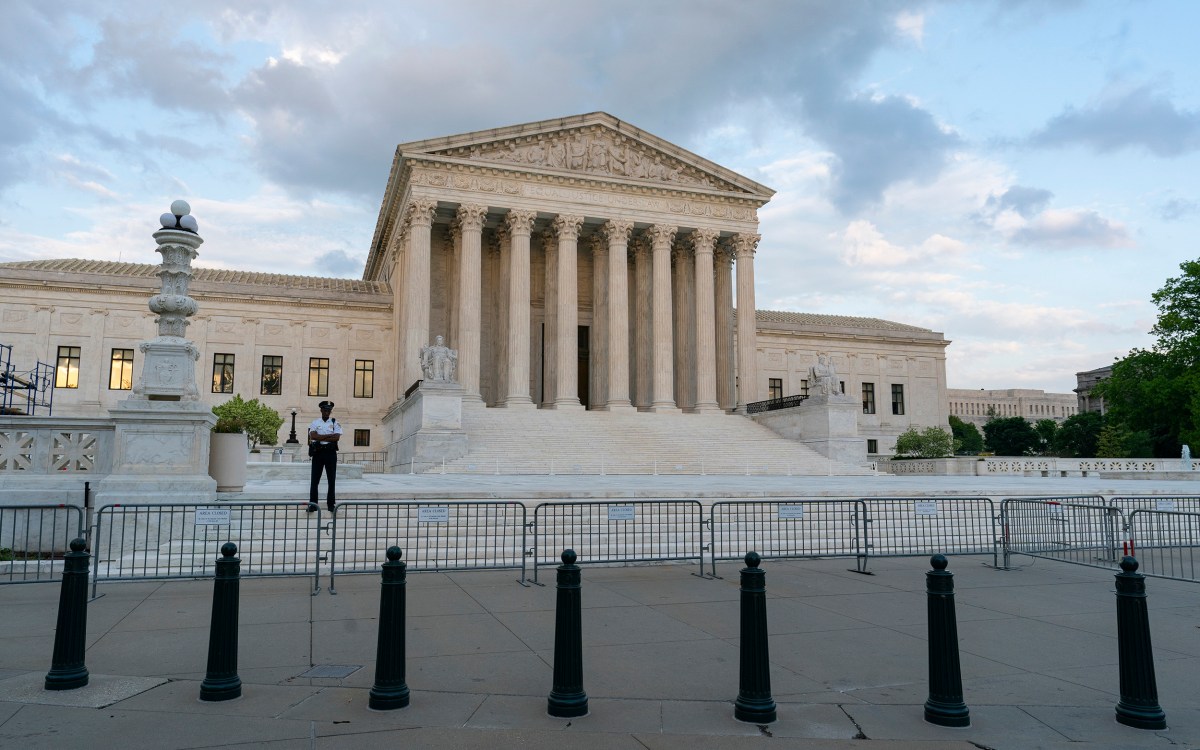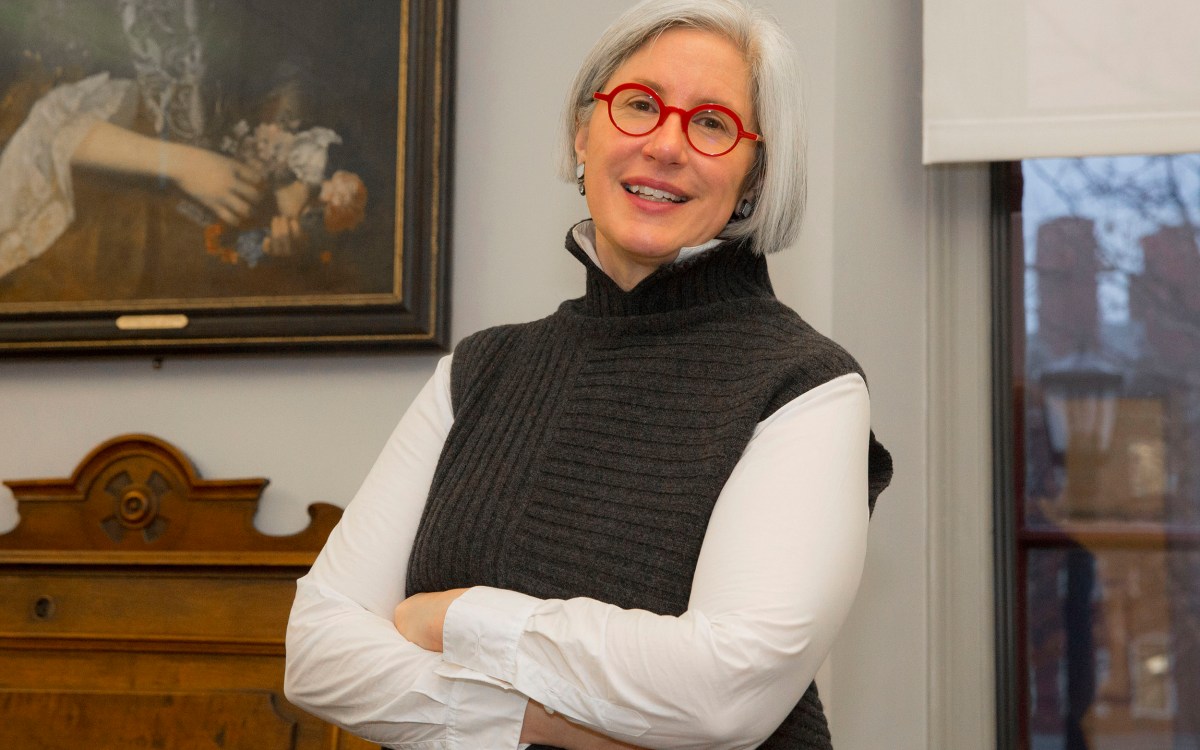
Following the Supreme Court’s reversal of Roe v. Wade on Friday, rallies were held in cities across the U.S., including Boston where protesters gathered at the State House.
Vincent Ricci/SOPA Images/Sipa USA via AP
Clarence Thomas isn’t kidding
Legal scholar Mary Ziegler sees ‘selective’ history in SCOTUS ruling overturning Roe and signs that other landmark protections are in jeopardy
The Supreme Court’s ruling in Dobbs v. Jackson Women’s Health Center, released Friday, overturned two landmark legal precedents protecting a woman’s right to abortion.
Writing for the conservative majority, Justice Samuel Alito called the court’s 1973 decision in Roe v. Wade “egregiously wrong,” primarily because abortion was never mentioned as a right of liberty under the Due Process Clause of the 14th Amendment of 1868. Concurring, Justice Clarence Thomas attacked the notion that there are rights implied by the Constitution, such as the right to marry without restriction or the right to use birth control, opening the door to cases that challenge other important decisions. In a dissent, Justices Stephen Breyer, Sonia Sotomayor, and Elena Kagan took aim at what they called a “cavalier approach” to upending nearly 50 years of settled law.
Legal historian Mary Ziegler ’04, J.D. ’07, a visiting professor at the Law School and the author of “Dollars for Life: The Anti-Abortion Movement and the Fall of the Republican Establishment,” responded to the historic ruling in an interview with the Gazette. The interview has been edited for clarity and length.
Q&A
Mary Ziegler
GAZETTE: What’s your impression of the arguments advanced by the majority?
ZIEGLER: It’s very much in keeping with what the court’s been doing lately, which is that it’s based on history, but a particular kind of reading of history — in this case, a reading of history that goes against what most historians of the 19th century have been saying, and a kind of reading of history that’s very selective. The court puts a lot of emphasis on the idea that Roe was bad for American democracy and bad for the legitimacy of the court, which is, of course, a historical argument for which the court provides no historical support at all. So, it’s a historically driven methodology that’s very selective about what history means and when we invoke it.
GAZETTE: What’s the significance in Supreme Court history of overturning Roe and Casey, two landmark decisions that have been relied upon for decades and are supported by public opinion?
ZIEGLER: It’s pretty striking. It’s hard to imagine that any rights are very safe. Obviously, the court would answer, “Roe is uniquely controversial; abortion is different.” And it’s certainly possible to say that. But we know that historically, the court’s willingness or lack thereof to revisit rights has more to do with public backlash or accountability than it does with anything else. And Roe is the best known and most visible Supreme Court decision. So, if the court is willing to undo this right, it’s fair to ask why it wouldn’t be willing to undo other rights.

GAZETTE: Does the language of the decision open the door to new challenges to settled law around contraception, same-sex marriage, interracial marriage, as the liberal justices argue in the dissent?
ZIEGLER: Definitely. Clarence Thomas explicitly says, “This isn’t the end,” so that obviously opens the door. And the court’s reasoning, if it was consistently applied — if this were about logic and consistency — would definitely apply to other constitutional rights. The only thing really standing between the court and that would be something like policy or reassurances, and we know historically from the court that often those kinds of disclaimers have an expiration date. They may last for a while, but if Brett Kavanaugh or Samuel Alito was telling us not to worry about those rights today, that doesn’t mean that that won’t change, especially when Justice Thomas has said explicitly that he thinks that the time has come to revisit all of those rights, not just a few. And there’s no reason to think that he won’t have some sway over his colleagues as time moves on.
GAZETTE: Justices Breyer, Sotomayor, and Kagan use quite harsh language to criticize the decision itself (“From the very moment of fertilization now, a woman has no rights to speak of”) but also to blast the majority for its “cavalier approach” to stare decisis. What’s your view of the dissent? Is their response — that there is “no good reason for this upheaval in law and society” — a fair one?
ZIEGLER: There’s definitely some truth in that. Even Chief Justice John Roberts, who didn’t join the dissent because he thought Mississippi’s law was constitutional, said, essentially, “We don’t need to do this right now. This was not even the question we agreed to hear. The question we agreed to hear was whether Mississippi’s law was OK and whether viability was the line at which states could ban abortion.” There was no need for the court to take this case because there was no disagreement in the lower courts. So, this is not judicial restraint. This is the court wanting to do this.
GAZETTE: The dissenters blame politics for this decision, writing, “The court reverses course today for one reason and one reason only — because the composition of this court has changed.” Is that fair?
ZIEGLER: It’s hard to know, of course, what the motivations are. But any reasonable person will think that this is a partisan decision, in part because the court has done nothing to deter that. This is not something that the court took its time in doing. There’s no reason the court needed to take this case. The language of the opinion is unnecessarily divisive. We can’t know what was inside the justices’ minds, but we can know that the way they decided this will do nothing to dispel the idea that this is partisan. And that’s sad. It’s not good for the United States for people to be losing faith in all our democratic institutions, including the court. This is going to do much more damage and the court knows that and is not concerned. It says, at various points: “We can’t predict what people’s reaction to this will be, but frankly, we don’t care because our job is not to care what people think.”
GAZETTE: In returning the question of abortion to the states, the dissenting justices warn of interstate disputes over things like the selling and mailing of abortion medications, the criminalization of interstate travel, sending money electronically across state lines to pay for an abortion, among other issues. What kinds of legal challenges does this decision potentially set up?
ZIEGLER: One of the most striking things I’ve seen lately is the National Right to Life Committee’s model law, which proposes sweeping criminal consequences for people who run websites on how to use abortion medication, people who counseled people on how to have medication abortions. The definition of folks who are going to be considered accomplices is going to be extraordinarily broad and not just include people like doctors. There’s going to be a universe of people who could potentially get swept up in this.







